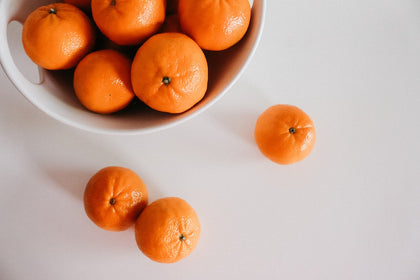Nourishing your hair goes so much farther than the shampoo you use. Research has shown that proper nutrition is a must for gorgeous hair and strong growth.
Among the many nutrients that can support proper hair growth, phytoestrogens are of growing importance. Phytoestrogens are compounds that exist naturally in plants. They’re commonly broken down into four different groups: isoflavonoids, flavonoids, stilbenes and lignans.
Many vegan foods contain phytoestrogens, including avocadoes, corn, pistachios, spinach, flaxseed and berries. But what effect do they have on hair growth, and how can you eat phytoestrogen-rich foods to support hair wellness?
#include-related-slider#
What Exactly Are Phytoestrogens?
One question people often ask is how phytoestrogens are different from estrogen.
Estrogen is a hormone that exists in both women and men. It plays a vital role in the female reproductive system, but also has other jobs to do in the body, such as protecting bones, skin and even influencing your mood. Phytoestrogens, on the other hand, purely exist in foods. In other words, phytoestrogens are a dietary form of estrogen, meaning they can only be consumed and not directly made by the human body.
Phytoestrogens can mimic estrogen in the body, but they also can act as the opposite of estrogen. For example, lignan can actually inhibit estrogen activity in the body. While phytoestrogens play complex roles in the body, research shows that many of the plant-based foods that contain them may help hair growth. But how?
Learn: How Folic Acid Affects Hair Growth
How Phytoestrogens Can Support Hair Growth
Since estrogens “profoundly alter hair follicle growth” (in a good way), they may help support the hair follicle and sebaceous glands—two essential components for hair growth—in preventing hair loss.
Why does this matter? You need healthy hair follicles to support healthy hair growth, and hair follicles can be impacted by a variety of things, including stress, inflammation and even your hairstyle. Sebaceous glands—which produce your body’s natural oil—also support and nourish hair follicles. However, while sebum—your skin’s natural oil—is essential for hair health, too much of it can actually inhibit healthy growth!
So finding a balance is important, and this where estrogen comes in. Estrogen may have a “protective role against hair loss,” as people with lower levels of estrogen are more likely to suffer from hair loss.
There are other reasons estrogen may decline in the body, including menopause, breastfeeding or being underweight. Dry skin, trouble sleeping, fatigue and irregular menstrual cycles could all be signs of low estrogen.
Consuming a healthy amount of phytoestrogens may be able to mimic estrogen in the body, which could encourage hair growth by supporting hair follicle and sebaceous gland health. When estrogen is low, the aging process may accelerate—and this includes hair loss!
It's clear that estrogens have significant roles in hair growth and sebum production, two things that can affect your hair health. But do phytoestrogens help people who aren’t low in estrogen with hair growth?
Even for women (and men!) who aren’t deficient in estrogen, phytoestrogens may help support healthy estrogen levels, which can, in turn, nourish proper hair growth. Why? Because phytoestrogens can actually block estrogen activity if estrogen is too high and mimic estrogen if it’s too low. This is why phytoestrogens have the reputation of confusing experts.
Also: Can Onion Juice Help Hair Grow?
Excellent Vegan Foods That Contain Phytoestrogens
Now that you know the role that phytoestrogens can potentially play in hair growth, what are some amazing vegan foods you can enjoy to support your hair?
Soy
Soy is in the isoflavonoid category of phytoestrogens. Isoflavonoids may help treat androgenetic alopecia, a form of hair loss you may have heard referred to as male-pattern baldness. However, androgenetic alopecia can affect women too. Soy is an extremely versatile food that can be eaten with just about any meal. Make a scramble with crumbled tofu and your favorite veggies, enjoy soy milk in smoothie, snack on some edamame, fry up some tempeh or make a miso soup!
Citrus Fruits
These include grapefruit, oranges, lemons and limes. Grapefruit is rich in naringenin, which is a flavonoid commonly found in citrus fruits. Naringenin can help stimulate hair growth. Hesperetin is another flavonoid found in citrus fruits that may help hair growth. Enjoy grapefruit or oranges plain for breakfast, or in yogurts or salads. You can also enjoy grapefruit juice. Lemons and limes make excellent additions to salad dressings, flavored water and even squeezed fresh over meals.
Tomatoes
Naringenin is also found in tomatoes, which you can enjoy raw for a snack (think cherry or grape tomatoes!) or on salads. Of course, you can enjoy tomatoes in staples such as salsas, pasta sauce and on sandwiches!
Related: Take the VEGAMOUR Hair Quiz
Grapes and Mulberries
Stilbenes, another phytoestrogen group, are present in grapes in addition to mulberries and peanuts. Mulberries tend to be more nutritious than grapes and may help restore hair growth and encourage strong, healthy locks. Mulberries can be purchased fresh or dried and make an excellent snack, and grapes make a healthy addition to any meal. Mulberries are also high in iron, vitamin E and vitamin A, all of which can support hair growth.
Pumpkin
You knew you weren’t a pumpkin spice latte girl for nothing, right? Pumpkin contains phytoestrogens that may help with hair loss. Enjoy pumpkin swirled into yogurt, smoothies and, of course, pumpkin butter! Pumpkin also makes an excellent base for a soup.
Flax Seeds
Flax seeds aren’t just a rich source of phytoestrogens. They also contain essential fatty acids which can help lower inflammation (which is important for healthy hair!).
Sesame Seeds
A perfect topping for savory or sweet dishes, sesame seeds are packed with fiber and phytoestrogens. They've been show in studies to have an effect on the estrogen levels in postmenopausal women. Sprinkle some sesames seeds on top of an asian-inspired stir fry and drizzle a few drops of sesame oil for an added punch.
The Bottom Line
Getting nourishing foods in your diet is the best way to consume phytoestrogen, as some research suggests that phytoestrogen supplements may not support health in the same way. In addition, many of these foods contain other helpful nutrients that all work together for hair health.
Do you love any of these foods that contain phytoestrogens? Consider adding some to your shopping list to support healthy eating and healthy hair growth.
More From VEGAMOUR
- Can You Lose Hair on a Vegan Diet?
- How to Choose the Best VEGAMOUR Hair Serum or Foam for You
- Where to Donate Your Hair



















